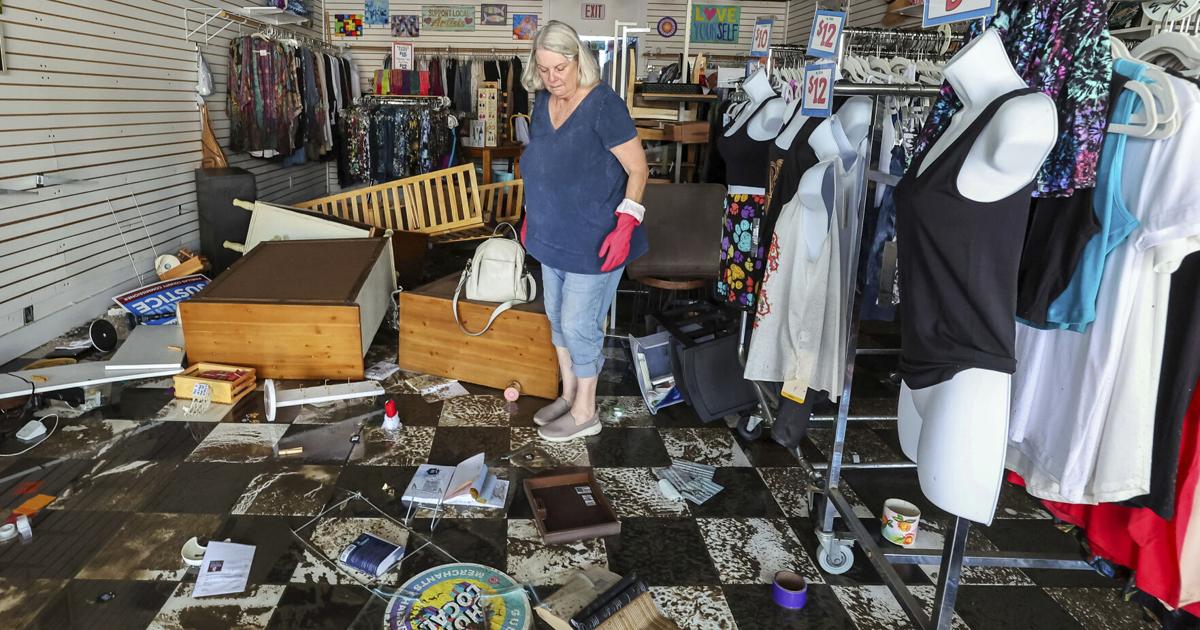PERRY, Fla. (AP) Drizzle caused by Hurricane Helene left several people stranded, without shelter and waiting to be rescued Saturday, as cleanup efforts began from a storm that caused at least 64 deaths, widespread destruction in the southeastern United States and left millions of customers without power.
“I’ve never seen so many homeless people as I have now,” said Janalea England of Steinhatchee, Florida, a small river town in the state’s rural northern part, as she turned her fish business into a donation site for friends. and neighbors, many of whom did not have their homes insured.
Helene made landfall in northern Florida as a Category 4 hurricane Thursday night with winds of 225 kilometers per hour (140 miles per hour).
From there, it moved quickly through Georgia, where Gov. Brian Kemp said Saturday that it looked like a bomb had gone off after seeing smashed homes and debris-strewn highways from the sky. Already weakened, Helene hit North and South Carolina, as well as Tennessee, with torrential rains, causing streams and rivers to overflow and pushing dams to their limits.
Western North Carolina was virtually cut off as mudslides and flooding closed Interstate 40 and other highways.
Hundreds of water rescues have been made, but none more dramatic than the one in rural Unicoi County in eastern Tennessee, where dozens of patients and workers were lifted by helicopter from the roof of a hospital on Friday. And the rescues continued the next day in Buncombe County, North Carolina, where part of Asheville was underwater.
To say this took us by surprise would be an understatement, said Quentin Miller, the county sheriff.
Although there have been deaths in the county, Emergency Services Director Van Taylor Jones said he was not prepared to report details, in part because downed cell towers hampered efforts to contact family members. .
Relatives posted desperate pleas for help on Facebook. Among those waiting to hear from loved ones was Francine Cavanaugh, whose sister told her she was going to check on some guests at a vacation cabin as the storm began to hit Asheville. Cavanaugh, who lives in Atlanta, has not been able to contact his sister since.
“I think people are completely stranded,” he commented.
The storm, which is currently a post-tropical cyclone, is expected to pass over the Tennessee Valley on Saturday and Sunday, the National Hurricane Center said.
Catastrophic floods
Helene caused the worst flooding in a century in North Carolina, where Governor Roy Cooper described it as catastrophic as search and rescue teams from 19 states and the federal government rushed to help. One community, Spruce Pine, was inundated with more than 60 centimeters (2 feet) of rain from Tuesday through Saturday.
And in Atlanta, 11.12 inches (28.24 centimeters) of rain fell in 48 hours, a record for that period since records began in 1878.
US President Joe Biden said Saturday that the devastation caused by Helene has been overwhelming and promised to send help.
Helene is the deadliest tropical cyclone to hit South Carolina since Hurricane Hugo killed 35 people when it made landfall north of Charleston in 1989. Deaths have also been reported in Florida, Georgia, North Carolina and Virginia.
According to Moodys Analytics, between $15 billion and $26 billion in material damage is expected. AccuWeather’s preliminary estimate of Helene’s total damage and economic losses in the United States is between $95 billion and $110 billion.
Climate change has exacerbated the conditions that allow these types of storms to thrive, which intensify rapidly in warmer waters and become powerful cyclones sometimes within hours.
Payne reported in Tallahassee, Florida, and Hollingsworth in Kansas City, Missouri. Associated Press writers Seth Borenstein in New York; Travis Loller in Nashville, Tennessee; Jeff Amy in Atlanta; Susan Haigh in Hartford, Connecticut, and Freida Frisaro in Fort Lauderdale, Florida, contributed to this report.
